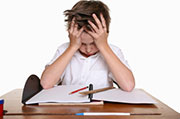- 8 Ways to Increase Dopamine Naturally
- 7 Best Breads for Maintaining Stable Blood Sugar
- Gelatin vs. Collagen: Which is Best for Skin, Nails, and Joints?
- The Long-Term Effects of Daily Turmeric Supplements on Liver Health
- Could Your Grocery Store Meat Be Causing Recurring UTIs?
- Are You Making This Expensive Thermostat Error This Winter?
- Recognizing the Signs of Hypothyroidism
- 10 Strategies to Overcome Insomnia
- Could Artificial Sweeteners Be Aging the Brain Faster?
- Techniques for Soothing Your Nervous System
Kids With Head Injuries May Be Prone to Depression


FRIDAY, Oct. 25Children who’ve suffered a concussion or other head injury seem to have a much higher-than-average rate of depression, a new study finds.
Using data from a U.S. health survey, researchers found that children and teenagers who’d ever sustained a brain injury were much more likely to have ever been diagnosed with depression.
Overall, 15 percent had received that diagnosis, while the national prevalence was less than 4 percent, the investigators noted.
The finding does not prove that kids’ head injuries caused the depression, said Keith Yeates, a pediatric neuropsychologist who was not involved in the study.
But there is a “well-documented” connection between brain injury, particularly more severe ones, and depression in adults, said Yeates, who heads pediatric psychology and neuropsychology at Nationwide Children’s Hospital in Columbus, Ohio.
There have been some small studies of children, but the findings have been more mixed, according to Yeates. While this latest study doesn’t prove cause-and-effect, it does support an association between brain injury and depression in kids, he said.
It’s not clear why the link exists, Yeates noted. Even so, he said doctors should assess children for behavioral problems and mood symptoms, including depression and anxiety, as part of their follow-up after a head injury.
Dr. Matthew Wylie, a pediatric emergency specialist who led the study, agreed. “It’s helpful for pediatricians to recognize that there is this potential for depression, and to be attuned to it.”
Wylie presented the findings Friday at the American Academy of Pediatrics national conference in Orlando, Fla.
The results are based on a 2007 nationally representative study covering nearly 82,000 children and teens younger than 18. Just over 2,000 parents said their child had ever been diagnosed with a “brain injury or concussion,” and just over 3,100 said their child had ever been diagnosed with depression — for a national rate of 3.7 percent.
Among kids with a past head injury, however, the rate of depression was about four times higher, at 15 percent, the investigators found.
The researchers then weighed other factors in children’s depression risk, such as family income and mothers’ mental health. In the end, kids with a history of head injury still had double the risk of depression as other kids.
The study had a number of limitations, both Wylie and Yeates pointed out.
One is that “brain injury” and “concussion” were lumped together into one question, Yeates noted. So it’s not possible to tell whether kids who suffered mild concussions had the same depression risk as those with more serious brain injuries.
It’s likely that more severe injuries would carry a greater risk, Wylie said. But that’s a question for future studies, he added.
It’s also unclear which came first, the brain injury or the depression. Yeates said it’s possible that people with depression are at greater risk of accidents and injury — because, for example, they have difficulty concentrating or are less aware of their surroundings.
On the other hand, there are reasons to believe that a blow to the head could contribute to depression. “One possibility is that there are alterations to the brain structure in areas associated with mood regulation,” Yeates explained.
There could also be indirect links. If a brain injury is serious enough to hinder a child’s functioning and ability to socialize with friends, that could lead to depression, Yeates said.
As for what parents can do, Wylie advised focusing on head injury prevention: Bike helmets, proper seat belt use and safety equipment for sports will all lower risk. If your child has already suffered a concussion or other brain injury, Wylie said, be on the lookout for potential depression symptoms.
At the same time, though, Yeates stressed that parents should not be unduly alarmed. The majority of childhood brain injuries are concussions or other milder forms, and while they should be taken seriously, most kids recover fully, he said.
The data and conclusions of research presented at medical meetings should be viewed as preliminary until published in a peer-reviewed journal.
More information
The U.S. Centers for Disease Control and Prevention has more on concussion and other brain injuries.
Source: HealthDay
Copyright © 2026 HealthDay. All rights reserved.










